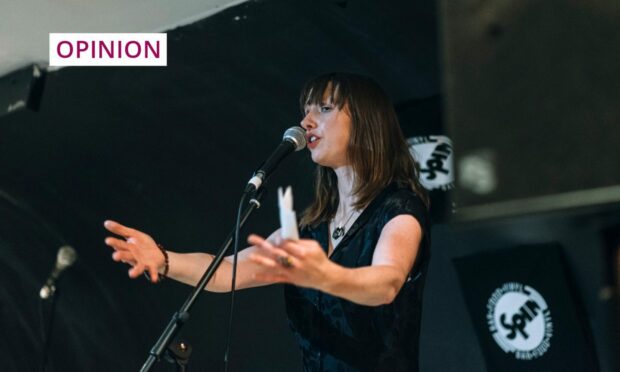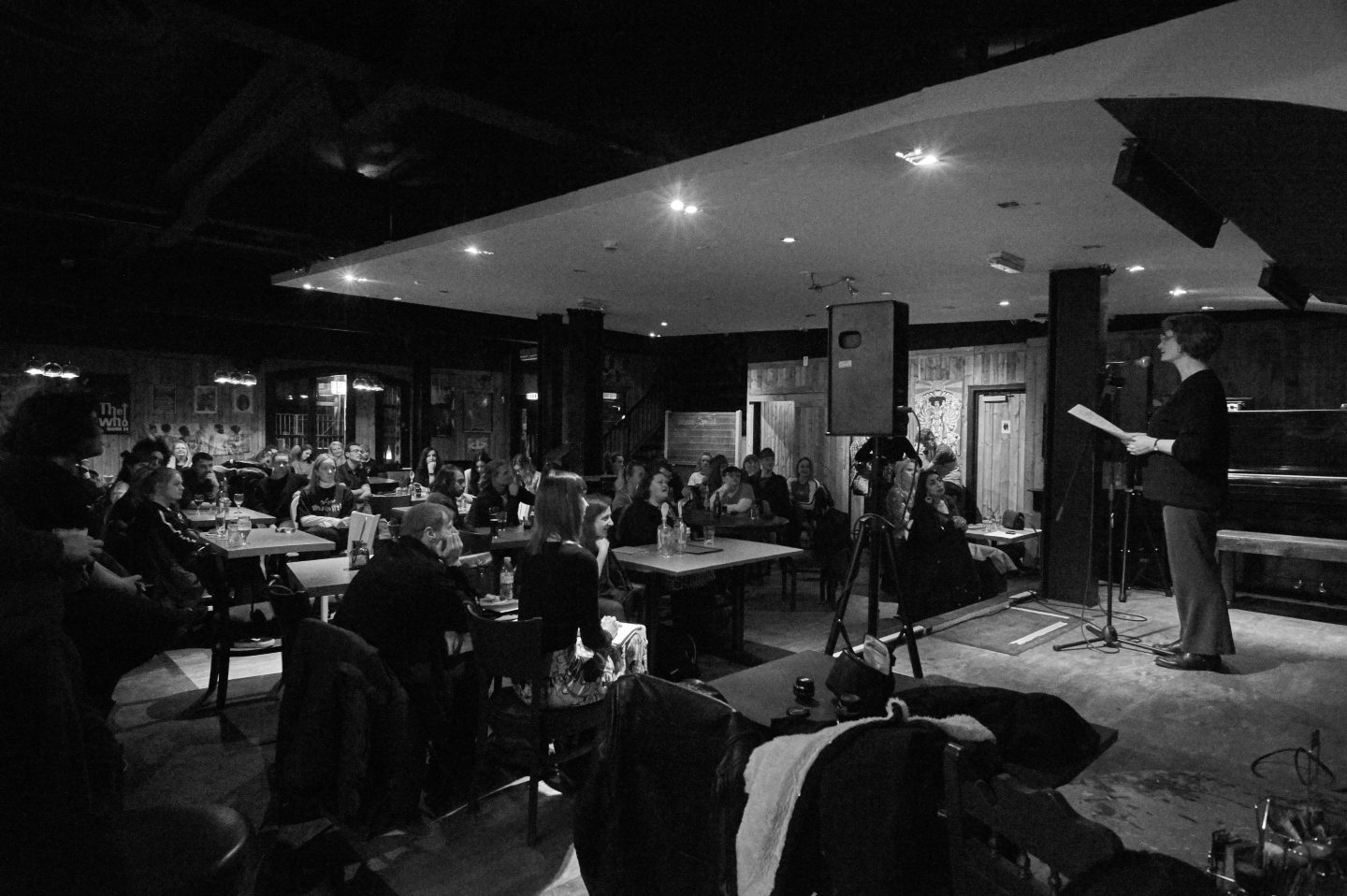The first act on stage, John, placed a stuffed crow behind the microphone, pressed play on a tape recorder (an actual old-school tape recorder) and sat back down with the rest of us in the audience to watch.
The crow’s name was Bobby Shoes. The tape recorder played the crow’s musings (narrated by John) as he wandered through nearby Forest Fields park. Titters and laughter broke out from the audience as we nursed our pints.
Bobby Shoes was a staple at the Speech Therapy spoken word night hosted in Nottingham’s Guitar Bar, along with the rest of us ragtag bunch of poets and weirdos. I loved it; it felt like home.
Spoken word appealed to me because it seemed like such a freeing art form: you could write anything, say anything, you didn’t need any special training or kit and there were no gatekeepers.
The Speech Therapy host, Miggie, welcomed everyone and seemed especially pleased at work that was politically radical, extremely weird or very dark. His own work about growing up in high-rise towers in inner city London was equal measures savage and beautiful. I wrote stream-of-consciousness “poems” of sorts, mostly about relationships: short and more enduring connections, minor and major heartbreaks.
When I moved to Aberdeen for work in late 2016, I went looking for similar nights. There was the brilliant Poetry at Books and Beans, which is still running on the last Thursday of the month. There was the University of Aberdeen English Literature Society night, held in hallowed performance space The Blue Lamp, also still running. It felt like there was room for more. Thus, Speakin’ Weird was born.
I created a social media page and some posters featuring a clumsily photoshopped picture of a zebra with leopard print stripes, based on a dream my friend had. On the first night, downstairs in BrewDog at the Castlegate in May 2017, I was expecting maybe a handful of poets and their friends. But, at the appointed time of 8pm, people just kept coming.
I was a little overawed by the volume and enthusiasm of the crowd. Why are all these people here and why are they so excited for poetry? I took a couple of glugs of red wine and mounted the stage to welcome them.
Autobiographical, authentic and cathartic
Modern spoken word traces its roots back to the jazz poets of the 1920s, who would perform poems accompanied by live jazz music. This art form in turn influenced the Beat Poets in the 1950s and the Black Arts Movement from the 1960s, through to the rap and hip hop scenes in New York in the 1990s.
The poetry slam format, where poets compete by reciting three-minute works, was popularised in the 1990s, with the first one taking place in the UK in 1994.
Spoken word has traditionally been seen as something of a lower art form compared to page poetry. This isn’t surprising, given its roots among black artists, removed from established literary institutions and forms of writing. This work is made to be experienced live by an audience, so is more ephemeral than the written word and more contingent on the relationship between poet and listener.
Spoken word poetry is often autobiographical, sometimes dealing with themes of trauma and oppression, leading critics to claim that it’s closer to a form of group catharsis than art. But this vulnerability and authenticity is also a key to its beauty and joy. You have a room full of people holding space for someone to share something they might never have shared before. Spoken word doesn’t have to be catharsis, but when it is, it can create magic.
Aberdeen’s unique spoken word scene has grown richer
At the first Speakin’ Weird, I broke the ice with some stand-up comedy material, poking fun at my adopted home (Aberdeen’s new tourism slogan: if yesterday was a place!). There were a number of performers that night and in the coming months who became regulars.
Aberdeen’s spoken word scene got richer, with new nights beginning and several voices becoming nationally recognised performance poets, including Jo Gilbert and Mae Diansangu, to name just two. And people kept showing up. Aberdeen had decided Speakin’ Weird was a thing.
Next Speakin' Weird #spokenword night is 13th September, 7:30pm, Spin, Aberdeen.
Featuring the brilliant Noon Salah Eldin headlining.
Bring your words for the #openmic, sign up on the night. pic.twitter.com/pgWwIgyJCu
— Orla Kelly (@Sparklechops3) August 17, 2023
We soon moved venue to Spin on Littlejohn Street, where the event still takes place on the second Wednesday of the month, with a featured headline poet, alternating between Speakin’ Weird regulars and visitors. A highlight for me is the new people who turn up every month to share their work on the open mic, and the variety of styles and voices on the stage.
Spoken word is sometimes accused of being a bit samey, with everyone mimicking the cadence of its originators in the US. But, for whatever reason, this hasn’t happened in Aberdeen – no two people sound the same. And, in terms of cultural uniqueness, the north-east has the advantage of its own language, Doric, meaning that some poetry in Aberdeen literally can’t sound like it does anywhere else.
If you’re free on the second Wednesday of the month come down to Spin, and we’d love to hear from you.
Orla Kelly is a writer and comedian, originally from Ireland and based in Aberdeen

